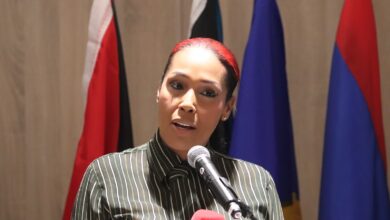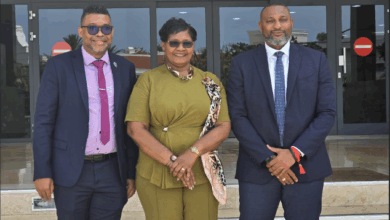Chair, Mr. Dave Clement
Mr. Neville Grainger, Vice-President, Finance, Caribbean Development Bank (CDB)
Ms. Antonia Popplewell, Permanent Secretary, Ministry of Planning and Social Development,
Ms. Shirley Christian-Maharaj, Ag. Director of Statistics, Central Statistical Office
Dr. Hamid Ghany, Dean, Faculty of Social Sciences, University of the West Indies
Mr. Neil Pierre, Director, UNECLAC
Professors Chukwudum Uche and Dr. Godfrey St. Bernard and Dr. Jimmy Tindigarukayo
Other Representatives of the Government of Trinidad and Tobago
Staff of the CARICOM Secretariat
Participants
Other Invited Guests
Members of the Media
Good morning everyone.
My task is to deliver the Opening Remarks of Ambassador Lolita Applewhaite, the Deputy Secretary-General of CARICOM. She was to start her remarks by saying that this is one time that she had no second thoughts about interrupting her vacation to perform a spot of duty. It was easy for her to accept this invitation, given the regularity with which I have advocated the need for enhancing the statistical capacity of our Community and, even more so, when the specific course has focused on social statistics. Unfortunately, she is not here today.
A favourite whipping horse of the Secretary-General is that there is a crying need for the Community to have at its disposal, reliable social statistics. Therefore it is with pleasure today, on behalf of the Secretary-General, that I thank Professor Compton Bourne, President of the Caribbean Development Bank (CDB), for the Bank’s assistance in financing this multi-year training programme in the area of Demographic Analysis.
Demographic analysis contributes to the wider area of population studies and the diagnosis of population dynamics that engage researchers from multiple disciplines, including anthropology, biology, economics, political science, history and sociology. Population growth, as well as fertility, mortality and migration have economic, social and environmental impacts. These are areas in which critical analyses have to be undertaken if the Community is to be provided with the tools to enable the successful operation of the CARICOM Single Market and Economy (CSME). They will also assist in the achievement of the United Nations Millennium Development Goals (MDG), and in enabling the benchmarking of poverty and other related social issues.
It is quite relevant that the Inter-American Development Bank, as part of a study entitled the “Quality of Life”, should point out: “Measuring the quality of life is the subject of growing attention throughout the world since it is widely recognised that Gross Domestic Product (GDP) and other measures of economic activity are incomplete indicators of the progress of societies and the welfare of its people.”
Enabling the capabilities to conduct demographic analysis would therefore assist in solving some of the complex challenges in the assessment of social and environmental impact that require the analysis of relationships of the multi-disciplinary processes that both influence and are affected by population and its components.
The conclusion of the first of three seven-week training workshops in Demographic Analysis is the start of a process to focus attention on the real engine that will drive development of the Caribbean Community – its people. The timing of this initiative could not have been better planned, coming as it does less than a month after the Heads of Government at their Twenty-Eighth Regular Meeting in Barbados put functional co-operation at the centre of the integration process.
It is in that milieu – functional co-operation – that the statistics related to health, education, labour, gender, for example, become a critical element in the planning and development process. These are the areas which directly relate to the everyday lives of our people and will enable our statisticians and analysts to provide the empirical evidence based upon which decisions could be taken.
This intervention seeks therefore to shore up capacity for data gathering and analysis, improve the collection of base data, and provide timely and accurate statistics for integration into national planning frameworks, as well as the preparation of the MDG reports. These were areas identified in many fora as major challenges for many of the countries of the Region. It is expected therefore that at the end of this three-part course, the Community would have built the capacities of statistical institutions to provide the requisite data for policy planning and decision-making, including MDG reporting. This regional approach would also provide for the development of a harmonised framework which would allow for comparability of data across countries.
This would be achieved by the training of statistical personnel over the period, by building the capacity of statisticians and social researchers to analyse demographic data in the conduct of research and policy formulation. Specifically, it would build the technical capacity of approximately 95 persons in the Region drawn from the National Statistical Offices and other line Ministries to produce and analyse social data. This training is also critical to the forthcoming 2010 Round of Population and Housing Censuses. The training also comprises a monitoring and evaluation component to assess the impact of the training.
There are other benefits to be derived from this programme. These include:
a) the promotion of good governance through supporting the creation of a modern, effective and accountable public sector capable of delivering valued public services;
b) the implementation of the mandates from the Council of Human and Social Development, and from other organs, to implement measures to improve the range and quality of statistics in the Region;
c) assisting in the Region’s development, to analyse available data from censuses and surveys, and to inform policy in a wide range of areas, such as fertility, mortality, and health in general; education; economic activity; the ageing population; gender issues; children and youth; and migration.
To you the participants, you are doubly charged with national and regional responsibilities and the Community will be looking to you to demonstrate the benefits you have gained from this programme. We are therefore on to a win-win situation with the added bonus of strengthening the relationship between the CARICOM Secretariat and the CDB as both organisations strive to assist the Region in achieving the goal of a viable, prosperous and stable society.
I close by thanking all the persons who have contributed and supported the Secretariat during this Workshop, in particular the lecturers of UWI/SALISES for their tireless efforts and the passion applied in nurturing the participants, the CDB, as already mentioned, and the Government and people of Trinidad and Tobago and specifically the Central Statistical Office, and finally, you, the participants, for your efforts, interest and commitment.
I thank you.





